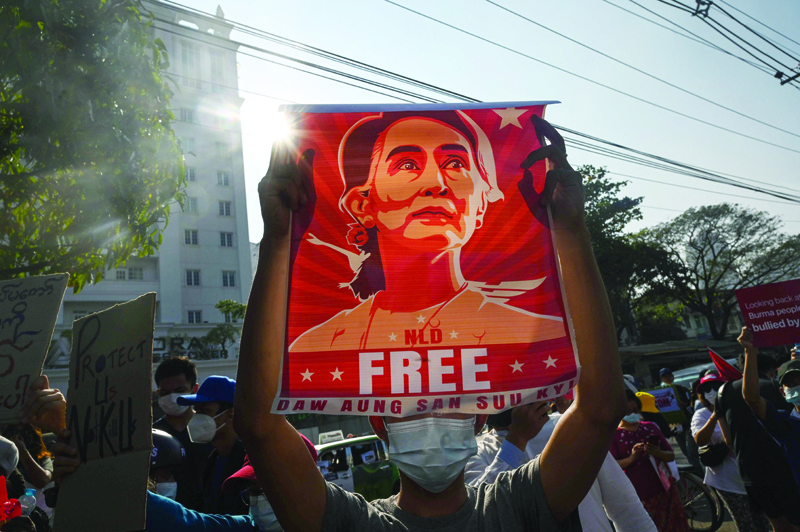 YANGON: A protester holds up a poster featuring Aung San Suu Kyi during a demonstration against the military coup at in front of the Central Bank of Myanmar in Yangon yesterday.-AFP
YANGON: A protester holds up a poster featuring Aung San Suu Kyi during a demonstration against the military coup at in front of the Central Bank of Myanmar in Yangon yesterday.-AFPYANGON: Myanmar's junta deployed extra troops around the country and choked the internet yesterday as it intensified a crackdown on anti-coup protests, but defiant demonstrators again took to the streets. The military has steadily escalated efforts to quell an uprising against their seizure of power two weeks ago, which saw civilian leader Aung San Suu Kyi detained along with hundreds, including members of her democratically elected government. The generals imposed an hours-long internet shutdown yesterday morning and ratcheted up the military's presence across the country overnight, including armored vehicles in Yangon, the nation's commercial hub and biggest city.
But fresh protests again flared in the city, including near the central bank where troops were deployed. "Patrolling with armored vehicles means they are threatening people," said 46-year-old Nyein Moe, among the more than one thousand gathered in front of the bank. "People are marching on the streets and they don't care to be arrested or shot. We can't stop now. The fear in our mind is going away." Hundreds of engineering and technology students also protested in a northern district of Yangon, according to an AFP journalist.
Meanwhile, Myanmar's deposed leader Aung San Suu Kyi will appear in court via video conference this week over charges brought against her by the new military junta, her lawyer said yesterday. Army chief General Min Aung Hlaing has justified the February 1 coup by alleging widespread voter fraud in November's elections, which Suu Kyi's National League for Democracy (NLD) party swept. Two days after the putsch, the 75-year-old Nobel laureate was hit with the unusual charge of violating Myanmar's import and export law, after a search of her house found walkie-talkies.
President Win Myint-who, like Suu Kyi, was detained in a dawn raid on February 1 -- was charged with violating coronavirus restrictions when he took part in a campaign event last September that drew hundreds. Monitoring group NetBlocks reported that a "state-ordered information blackout" had taken Myanmar almost entirely offline early yesterday. Internet connectivity was later restored around the start of the working day, with Netblocks saying the blackout lasted around eight hours. But the monitor noted that most users in Myanmar were still barred from social media.
Declaration of war
Intensifying fears the military was going to impose a far harsher crackdown, troops in the northern city of Myitkyina fired tear gas then shot at a crowd on Sunday night. A journalist at the scene said it was unclear whether police had used rubber bullets or live rounds. Local media outlets said at least five journalists monitoring the protest were detained and released yesterday. They also published pictures of some people wounded in the incident. A joint statement from the US, British and European Union ambassadors urged security forces not to harm civilians.
UN Secretary-General Antonio Guterres echoed that call. Through his spokesman, he also asked the military to "urgently" allow Swiss diplomat Christine Schraner Burgener to visit Myanmar "to assess the situation first hand". The US embassy advised American citizens to shelter in place and not risk defying an overnight curfew imposed by the regime. UN special rapporteur Tom Andrews said the junta's efforts to rein in the burgeoning protest movement was a sign of "desperation" and amounted to a declaration of war against its people. "Attention generals: You WILL be held accountable," he tweeted. Much of the country has been in uproar since soldiers detained Aung San Suu Kyi and her top political allies on February 1, ending a decade-old fledgling democracy after generations of junta rule.
The Nobel laureate spent years under house arrest during an earlier dictatorship and has not been seen in public since she was detained. Suu Kyi's custody period was expected to expire today, but her lawyer said yesterday that she has been remanded until February 17, citing a judge. An internet blackout last weekend failed to quell resistance that has seen huge crowds throng big urban centers and isolated frontier villages alike. Striking workers who spearheaded the campaign are among at least 400 people to have been detained since the coup, said the Assistance Association for Political Prisoners monitoring group.
'We don't trust anyone'
Fear of arrest did not deter big crowds from returning to streets around the country for a ninth straight day of street protests on Sunday. In Dawei, seven police officers broke ranks to join anti-coup protesters, mirroring local media reports of isolated defections from the force in recent days. Parts of the country have in recent days formed neighborhood watch brigades to prevent the arrests of residents joining the civil disobedience movement.
"We don't trust anyone at this time, especially those with uniforms," said Myo Ko Ko, member of a street patrol in Yangon. The country's new military leadership has so far been unmoved by a torrent of international condemnation. The junta insists it took power lawfully and has instructed journalists in the country not to refer to it as a government that took power in a coup. - AFP









